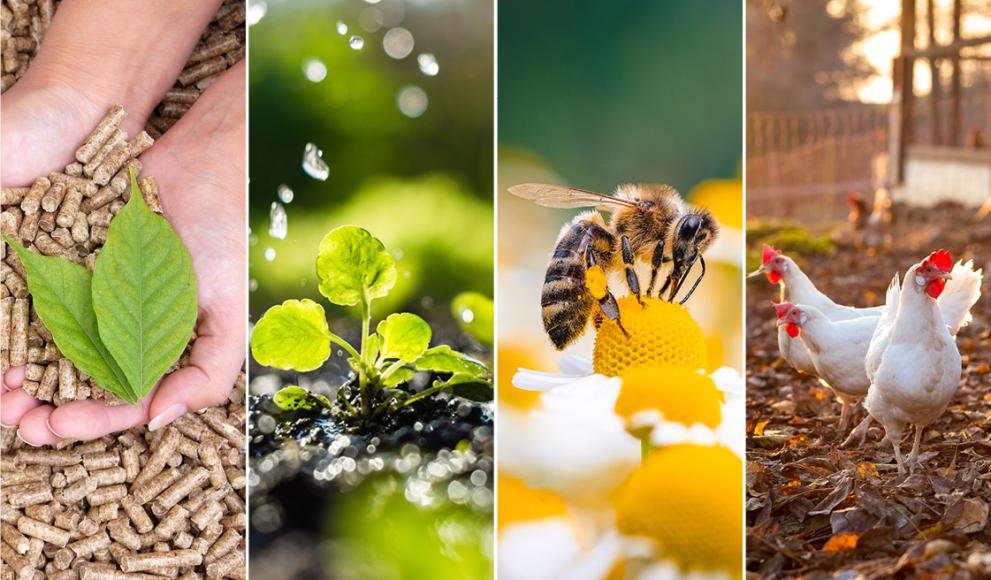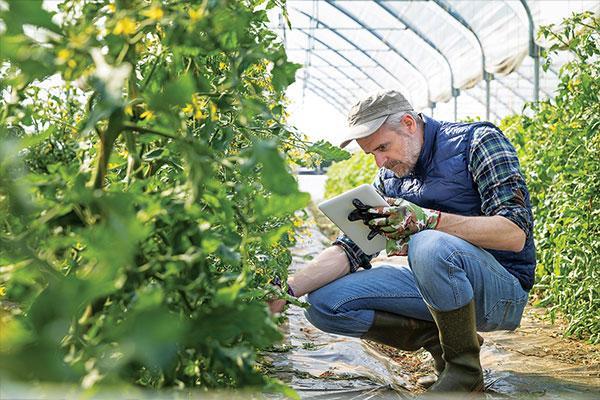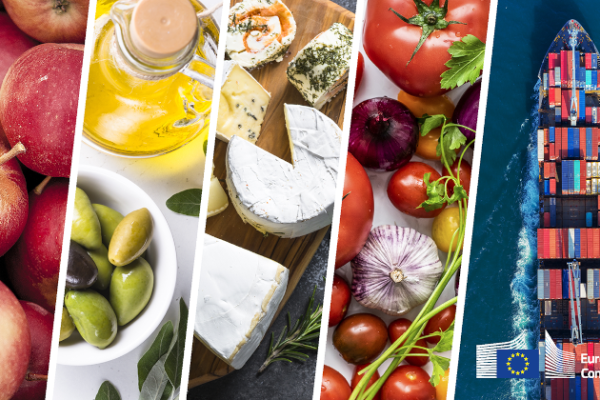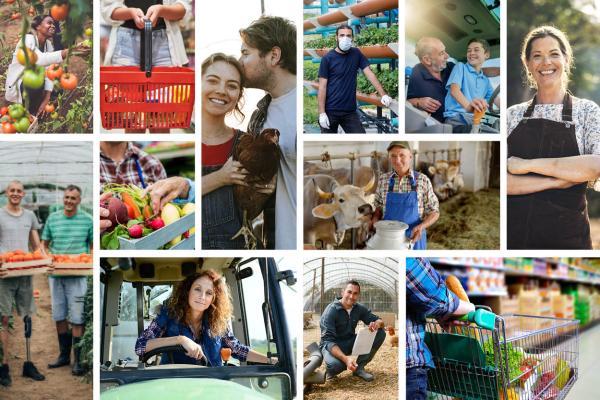
The common agricultural policy (CAP) is instrumental in managing the transition towards a sustainable food system and in strengthening the efforts of European farmers to contribute to the EU’s climate objectives and to protect the environment.
Eco-schemes are a new instrument in the CAP to support this transition. EU countries set eco-schemes in their CAP Strategic Plans. The Commission assessed and approve them as key tools for the CAP to deliver on the Green Deal targets.
Eco-schemes at a glance
Agricultural practices that could be supported by eco-schemes have to meet the following conditions:
- they should cover activities related to climate, environment, animal welfare and antimicrobial resistance;
- they shall be defined on the basis of the needs and priorities identified at national/regional levels;
- their level of ambition has to go beyond the requirements and obligations established under the baseline (including conditionality);
- they shall contribute to reaching the EU Green Deal targets.
EU Green Deal targets

Reduce by 50% the overall use and risk of chemical pesticides and reduce use by 50% of more hazardous pesticides by 2030

Achieve at least 25% of the EU’s agricultural land under organic farming and a significant increase in organic aquaculture by 2030

Reduce sales of antimicrobials for farmed animals and in aquaculture by 50% by 2030

Reduce nutrient losses by at least 50% while ensuring no deterioration in soil fertility; this will reduce use of fertilisers by at least 20 % by 2030
CAP Strategic Plans put into practice enhanced conditionality, eco-schemes, farm advisory services as well as agri-environmental and climate measures and investments to address the Green Deal targets, in particular those stemming from the Farm to Fork Strategy and the Biodiversity Strategy for 2030, and to fulfil the climate and environmental specific objectives of the CAP.
CAP specific objectives

Contribute to climate change mitigation and adaptation, as well as sustainable energy

Foster sustainable development and efficient management of natural resources such as water, soil and air

Contribute to the protection of biodiversity, enhance ecosystem services and preserve habitats and landscapes

Improve animal welfare and address antimicrobial resistance
Actions under the CAP Strategic Plans
EU countries' measures detailed in the CAP Strategic Plans cover various areas of environment, climate change and animal welfare actions, which are the following:
a. Climate mitigation – including reduction of GHG emissions from agricultural practices, as well as maintenance of existing carbon stores and enhancement of carbon sequestration
b. Climate change adaption – including reduction of GHG emissions from agricultural practices, as well as maintenance of existing carbon stores and enhancement of carbon sequestration
c. Protection or improvement of water quality – and reduction of pressure on water resources
d. Prevention of soil degradation – soil restoration, improvement of soil fertility and of nutrient management
e. Protection of biodiversity – conservation or restoration of habitats or species, including maintenance and creation of landscape features or non-productive areas
f. Actions for a sustainable and reduced use of pesticides
g. Actions to enhance animal welfare – or address antimicrobial resistance

EU countries' CAP Strategic Plans combine a wide range of targeted interventions to address their specific needs and deliver tangible results in relation to EU-level objectives, while contributing to the Green Deal.
The plans must contribute to, and be consistent with, EU legislation and commitments relating to climate and the environment, including those laid out in the Farm to Fork and biodiversity strategies.
Examples of agricultural practices
The information provided on agricultural practices that eco-schemes could support, gives farmers, administrators, scientists, stakeholders and the public the opportunity to find out more on eco-schemes and share their experience. This list has been established after a thorough discussion with experts.
The following practices correspond to actions under the CAP Strategic Plans covering areas of environment, climate change and animal welfare listed above.
Practices established in EU policy instruments
- Organic farming practices, as defined in Regulation (EU) 2018/848 (b, c, d, f, g)
- Conversion to organic farming (b, c, d, f, g)
- Maintenance of organic farming (b, c, d, f, g)
- Integrated Pest Management practices, as defined in Sustainable Use Directive (b, c, d, e, f) and including:
- Buffer strips with management practices and without pesticide (c, e, f)
- Mechanical weed control (c, e, f)
- Increased use of resilient, pest-resistant crop varieties and species (b)
- Land lying fallow with species composition for biodiversity purpose (c, e, f)
Other practices
- Crop rotation with leguminous crops (a, b, d, f)
- Mixed cropping - multi cropping (b, d, e, f)
- Cover crop between tree rows on permanent crops - orchards, vineyards, olive trees - above conditionality (a, c, d, e, f)
- Winter soil cover and catch crops above conditionality (a, b, c, d)
- Low intensity grass-based livestock system (a, c, d, g)
- Use of crops/plant varieties more resilient to climate change (b, c, e, f)
- Mixed species/diverse sward of permanent grassland for biodiversity purpose (pollination, birds, game feedstocks) (c, d, e, f)
- Improved rice cultivation to decrease methane emissions (e.g. alternate wet and dry techniques) (a)
- Practices and standards as set under organic farming rules (b, c, d, f)
- Feeding plans: suitability of and access to feed and water, feed and water quality analyses (e.g. micotoxines), optimised feed strategies (g)
- Friendly housing conditions: increased space allowances per animal, improved flooring (e.g., straw bedding provided on a daily basis), free farrowing, provision of enriched environment (e.g. rooting for pigs, perching, nest-building materials, etc.), shading/sprinklers/ventilation to cope with heat stress (b, g)
- Practices and standards as set under organic farming rules (g)
- Practices increasing animal robustness, fertility, longevity and adaptability, e.g. lifespan of dairy cows; breeding lower emission animals, promoting genetic diversity and resilience (a, b, g)
- Animal health prevention and control plans: overall plan for reducing the risk of infections that require antimicrobials and covering all relevant husbandry practices, e.g. vaccination and treatments, enhanced biosecurity, use of feed additives, etc. (g)
- Providing access to pastures and increasing grazing period for grazing animals (a, b, g)
- Provide and manage regular access to open air areas (g)
- Establishment and maintenance of landscape features above conditionality (a, c, d, e)
- Management and cutting plan of landscape features (e, f)
- Establishment and maintenance of high-biodiversity silvo-pastoral systems
- Land lying fallow with species composition for biodiversity purpose (pollination, birds, game feedstocks, etc.) (c, e, f)
- Shepherding on open spaces and between permanent crops, transhumance and common grazing (b, d, e, f, g)
- Semi-natural habitat creation and enhancement (a, b, c, d, e, f, g)
- Reduction of fertiliser use, low intensity management in arable crops (a, b, c, d, e, f, g)
- Conservation agriculture (a, d)
- Rewetting wetlands/peatlands, paludiculture (a, c, d, e)
- Minimum water table level during winter (a, c, d)
- Appropriate management of residues, i.e. burying of agricultural residues, seeding on residues (a, c, d)
- Establishment and maintenance of permanent grassland (a, c, d, e, f)
- Extensive use of permanent grassland (a, c, d)
- Nutrients management plan, use of innovative approaches to minimise nutrient release, optimal pH for nutrient uptake, circular agriculture (a, c, d, f)
- Precision crop farming to reduce inputs (fertilisers, water, plant protection products) (e, f)
- Improving irrigation efficiency (b)
- Implementation of nitrates-related measures that go beyond the conditionality obligations (c, d, e,)
- Measures to reduce and prevent water, air and soil pollution from excess nutrients such as soil sampling if not already obligatory, creation of nutrient traps (c, d, e,)
- Managing crop water demand (switching to less water intensive crops, changing planting dates, optimised irrigation schedules) (b)
- Erosion prevention strips and wind breaks (b, d, e,)
- Establishment or maintenance of terraces and strip cropping (b, d, e,)
- Feed additives to decrease emissions from enteric fermentation (a)
- Improved manure management and storage (a)
Legal basis
Regulation (EU) 2018/848 on organic production and labelling of organic products and repealing Council Regulation (EC) No 834/2007.
Related links
Eco-schemes support farmers who adopt or maintain farming practices that contribute to EU environmental and climate goals.
Explanation of the objectives of the common agricultural policy for the 2023-27 period with supporting analysis and assessments of their policy relevance.
Policy, rules, organic certifications, support and criteria for organic farming.


